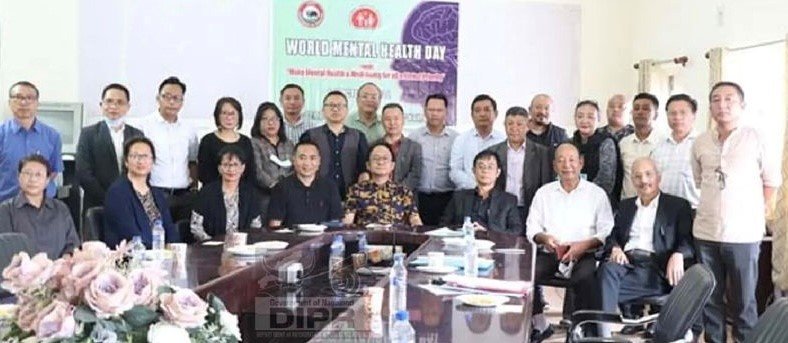Dr T Wabang, Director (Family Welfare) said that around 20,000 people in Nagaland are currently suffering from severe mental illness and that around two lakhs have minor mental illnesses. He was speaking at the World Mental Health Day programme organised by the Department of Health & Family Welfare (DHFW) at IDSP Hall, DHFW on 10 October.
Dr Wabang added that the COVID-19 pandemic has caused a rise in mental health disorders such as anxiety and depression. He therefore stressed that “mental health awareness should be propagated diligently to fight this illness together, and also mental health awareness should be recognized, promoted, and protected.”
He further said that the sole objective of observing World Mental Health Day was to create awareness about mental illness.
World Health Organisation had chosen ‘Make Mental Health & Well-being for all a Global Priority’ as the theme for World Mental Health Day 2022.
Principal Director, Dr K Vikato Kinimi, in his exhortation, lamented the loss of lives to mental health and said that the department has to play a very vital role in society to eradicate mental sickness and save lives.
Dr C Kezo, Deputy Director SPO, National Mental Health Programme (NMHP) gave a brief introduction to T-MANAS or Tele Mental Health Assistance and Networking Across State, an initiative of the Government of India.
T-MANAS is a 24×7 Tele mental health services that aims to provide equitable, accessible, affordable, and quality mental health care through as a digital component of the NMHP across all Indian states/UTs.
The toll-free number 14416 and 1-800-91-4416 will provide anybody who reaches out with integrated medical and psychological interventions including video consultations with mental health specialists, e-prescription, follow-up service and linkage to in-person services. It also aims to extend services to vulnerable groups of populations and difficult-to-reach populations.
Dr Kezo suggested that to implement T-MANAS in the state the existing resources and platforms are to be mapped and partnerships to be strengthened to ensure mental health services to the entire population especially vulnerable groups.


